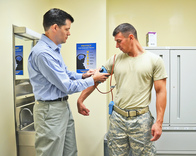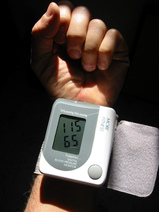
A common concern of pilots and air traffic controllers undergoing their medical exams is elevated blood pressure and how it will affect their license renewal. While the immediate concern relates to whether or not it will hinder or delay the renewal, the most important issue relates to long-term consequences of living with high blood pressure: the possibility of stroke and heart attack.
Elevated blood pressure or hypertension has been called “the silent killer,” because it usually causes no symptoms. Over time, however, high blood pressure is a major risk factor for hypertensive heart disease, coronary artery disease stroke, aortic aneurysm, peripheral artery disease, and chronic kidney disease (PMID: 10645931) Hypertension is classified as either primary (essential) hypertension or secondary hypertension. About 90–95% of cases are categorized as primary hypertension, defined as high blood pressure with no obvious underlying cause. The remaining 5–10% of cases are categorized as secondary hypertension, defined as hypertension due to an identifiable cause, such as chronic kidney disease, narrowing of the aorta or kidney arteries, or an endocrine disorder such as excess aldosterone, cortisol, or catecholamines (PMID: 12483255).
Elevated blood pressure or hypertension has been called “the silent killer,” because it usually causes no symptoms. Over time, however, high blood pressure is a major risk factor for hypertensive heart disease, coronary artery disease stroke, aortic aneurysm, peripheral artery disease, and chronic kidney disease (PMID: 10645931) Hypertension is classified as either primary (essential) hypertension or secondary hypertension. About 90–95% of cases are categorized as primary hypertension, defined as high blood pressure with no obvious underlying cause. The remaining 5–10% of cases are categorized as secondary hypertension, defined as hypertension due to an identifiable cause, such as chronic kidney disease, narrowing of the aorta or kidney arteries, or an endocrine disorder such as excess aldosterone, cortisol, or catecholamines (PMID: 12483255).
TRANSPORT CANADA GUIDELINES
According to Transport Canada's Guide for Aviation Medical Examiners: "On any visit, a blood pressure level of 180 mmHG or more systolic or 105 mmHg or more diastolic, precludes medical certification". This is, without doubt, a dangerously high level of blood pressure. The guide also states that levels between 140 and 180 mmHg systolic and / or 90 and 105 mmHg diastolic require further evaluation.
FAA GUIDELINES
"An applicant whose pressure does not exceed 155 mm mercury systolic and 95 mm mercury diastolic maximum pressure, who has not used antihypertensive medication for 30 days, and who is otherwise qualified should be issued a medical certificate by the Examiner."
Blood pressure readings in excess of these values will require the examiner to defer certification.
Blood pressure readings in excess of these values will require the examiner to defer certification.

Regardless of what the agencies deem as acceptable blood pressure levels, the important point to be aware of is that hypertension is a thief and a killer. Over time, it will rob you of your health and then bring about a premature death. This knowledge had just begun to be realized when I was a medical student. Many slightly older physicians were not aware of this and did not believe it was necessary to treat high blood pressure. In their defense, it should be noted that the available antihypertensive medications of the day had many unpleasant side effects. Patients felt worse taking medication. In addition, there were no studies to prove that lowering the blood pressure with these medications was actually beneficial.
Since that time, many new medications have been developed and numerous high quality studies have shown unequivocally that lowering the blood pressure with these medications is extremely beneficial.
Perhaps just as important to the pilot or air traffic controller is the fact that many of these medications are acceptable to both Transport Canada and the FAA with no restriction to the medical certification.
The take home message: Adequately treated, hypertension will not result in loss or restriction of your medical certificate. However, the complications of untreated hypertension very likely will.
Since that time, many new medications have been developed and numerous high quality studies have shown unequivocally that lowering the blood pressure with these medications is extremely beneficial.
Perhaps just as important to the pilot or air traffic controller is the fact that many of these medications are acceptable to both Transport Canada and the FAA with no restriction to the medical certification.
The take home message: Adequately treated, hypertension will not result in loss or restriction of your medical certificate. However, the complications of untreated hypertension very likely will.
HOW TO STAY FIT AND KEEP FLYING

Fortunately, there are many things you can do to reduce high blood pressure if you are above the acceptable limits set out in the guidelines. These include lifestyle changes such as:
- weight loss
- exercise
- low salt and low fat diets
- quite smoking
- reduce caffeine
If necessary, there are many medications to control hypertension that are approved by both Transport Canada and the FAA.
The most important thing to remember is high blood pressure does not need to prevent you from being a pilot or air traffic controller. A single elevated reading is not enough for a diagnosis of hypertension. Anxiety, stress, fatigue, time of day may all affect a blood pressure reading, and if this occurs, several readings need to be done to obtain an average. Do not let fear prevent you from discussing this important issue with your doctor.
DO THE SMART THING!
The most important thing to remember is high blood pressure does not need to prevent you from being a pilot or air traffic controller. A single elevated reading is not enough for a diagnosis of hypertension. Anxiety, stress, fatigue, time of day may all affect a blood pressure reading, and if this occurs, several readings need to be done to obtain an average. Do not let fear prevent you from discussing this important issue with your doctor.
DO THE SMART THING!
 RSS Feed
RSS Feed